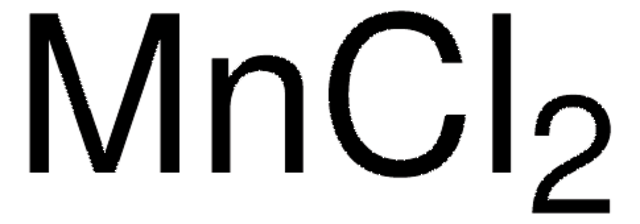450995
Manganese(II) chloride
AnhydroBeads™, −10 mesh, 99.999% trace metals basis
Synonym(s):
Manganese dichloride, Sacchite
About This Item
Recommended Products
product line
AnhydroBeads™
Quality Level
Assay
99.999% trace metals basis
impurities
≤15.0 ppm Trace Metal Analysis
particle size
−10 mesh
mp
652 °C (lit.)
density
2.98 g/mL at 25 °C (lit.)
SMILES string
Cl[Mn]Cl
InChI
1S/2ClH.Mn/h2*1H;/q;;+2/p-2
InChI key
GLFNIEUTAYBVOC-UHFFFAOYSA-L
Looking for similar products? Visit Product Comparison Guide
Application
Legal Information
Not finding the right product?
Try our Product Selector Tool.
accessory
Signal Word
Danger
Hazard Statements
Precautionary Statements
Hazard Classifications
Acute Tox. 3 Oral - Eye Dam. 1 - STOT RE 2
Target Organs
Brain
Storage Class Code
6.1D - Non-combustible acute toxic Cat.3 / toxic hazardous materials or hazardous materials causing chronic effects
WGK
WGK 2
Flash Point(F)
Not applicable
Flash Point(C)
Not applicable
Personal Protective Equipment
Choose from one of the most recent versions:
Already Own This Product?
Find documentation for the products that you have recently purchased in the Document Library.
Customers Also Viewed
Articles
The prevailing strategies for heat and electric-power production that rely on fossil and fission fuels are having a negative impact on the environment and on our living conditions.
Our team of scientists has experience in all areas of research including Life Science, Material Science, Chemical Synthesis, Chromatography, Analytical and many others.
Contact Technical Service









